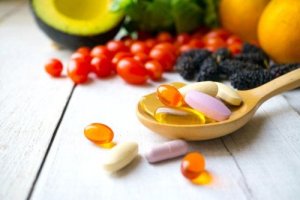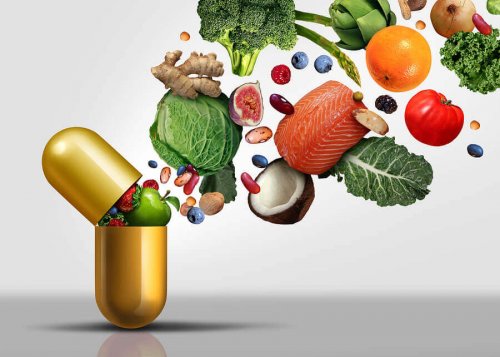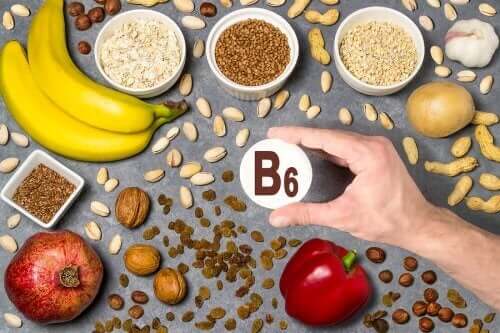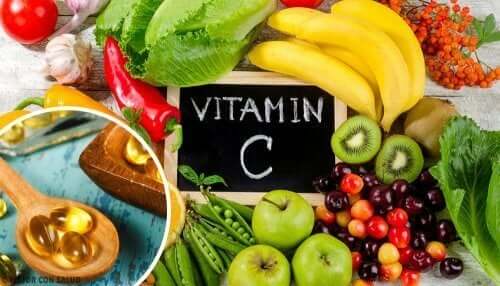What Are the Water-Soluble Vitamins?

Vitamins are necessary nutrients for the body’s proper functioning. Overall, there are both fat-soluble or water-soluble vitamins, depending on where they dissolve, as the names suggest. Unlike some minerals, they act in very small amounts. In addition, the body is unable to produce them. This is why you must include them in your diet.
Overall, the main functions of vitamins are activating food oxidation, metabolic reactions, and the use and release of the energy provided by food. Thus, the importance of these organic nutrients for cell vitality is easy to see. Therefore, you should definitely include them in your diet through the foods that you eat.
Vitamins

Each cell has the function of transforming amino acids, minerals, and other compounds into proteins, hormones, and enzymes. Some vitamins are part of these resulting compounds, which are indispensable for proper bodily functioning. Overall, of the 13 different vitamins that are currently known, we can distinguish two groups:
- Water-soluble vitamins. These dissolve in water. Thus, the body can’t store them. For this reason, it’s necessary to consume them every day, as the excess is expelled through sweat and urine.
- Fat-soluble vitamins dissolve in fat. Therefore, they’re stored in the body’s fat tissues and the liver. However, excessively consuming these vitamins can harm your health. This is why you should be careful with vitamin supplements and always consult your doctor or pharmacist.
Next, let’s take a more detailed look into the vitamins of the first group.
Water-soluble vitamins
First, this vitamin group includes the vitamins that dissolve in water and aren’t stored in the body. Here are some of them:
Vitamin B1 or thiamine
You can find this vitamin in nuts, whole grains, legumes, brewer’s yeast, and wheat germ. Overall, the main function of this vitamin is to release the energy that carbohydrates contain.
Therefore, vitamin B1 deficiency can cause:
- A significant decrease in blood sugar levels or hypoglycemia.
- Fatigue and irritability.
- Muscle weakness.
- Lack of concentration.
Also, you should read: How to Use Vitamin B1 as a Mosquito Repellent
Vitamin B2 or riboflavin
Next, this vitamin catalyzes the oxidation of fats, proteins, and carbohydrates. Overall, some good sources of this vitamin are milk, liver, beans, lentils, cheese, and nuts.
Not getting enough of this water-soluble vitamin can lead to visual disorders and oral and throat mucosa inflammation.
Vitamin B3, niacin, or nicotinic acid
You can mostly find it in legumes, nuts, grains, and brewer’s yeast. As for its function, it helps convert food into energy.
The disease caused by vitamin B3 deficiency, pellagra, is worth mentioning. This is a condition characterized by the appearance of skin spots and digestive and nervous disorders.
Vitamin B5, or pantothenic acid
This is a part of the immune system, as it helps defend the body from infections. In addition, it also plays a role in fat, protein, and carbohydrate metabolism. You can find it in all animal and vegetable tissues, as well as brewer’s yeast.
A deficiency of this water-soluble vitamin could lead to weakened defenses, favoring the development of infections.
This article may interest you: The 4 Best Vitamins To Boost Your Immune System
Vitamin B6, or pyridoxine

This vitamin plays a role in amino acid metabolism and hemoglobin synthesis. A vitamin B6 deficiency manifests with dietary problems.
Bananas, avocados, whole grains, and vegetables are the richest sources of vitamin B6.
Vitamin B8, or biotin
It’s found in many plant and animal foods, which is why people don’t tend to suffer a vitamin B8 deficiency. It binds to certain enzymes that play a role in the formation or use of carbon dioxide, which is why it exerts a coenzyme function.
Vitamin B9, or folic acid
It’s essential for DNA synthesis in cells of new tissues, such as fetuses. Also, it plays a role in the synthesis of red blood cells. Its deficiency induces anemia.
Lentils, beans, vegetables, and liver are the richest sources of vitamin B9.
Vitamin B12, or cyanocobalamin
The main source of vitamin B12 is liver. This vitamin is essential for the synthesis of red blood cells. It’s the only vitamin that contains a mineral, cobalt, hence its name.
Moreover, no plant or animal produces it, only some microorganisms. A deficiency of this vitamin also causes anemia.
Vitamin C, or ascorbic acid

Finally, vitamin C plays a role in the formation of proteins of the connective tissues and the regeneration of bone cartilage. Thus, a deficiency can cause openings in the connective tissue, subcutaneous bleeding, and difficulty healing, among other structural problems.
Fortunately, vitamin C is very easy to get: it’s found in countless fruits and vegetables, most notably citrus fruits and leafy green vegetables.
Conclusion
As you’ve seen, vitamins are vital substances for good health. Since we only mentioned the properties of water-soluble vitamins, it’s important to keep in mind that fat-soluble vitamins are also important – but that’s a topic for another article!
Don’t forget to have healthy eating habits to meet your recommended nutritional needs.
All cited sources were thoroughly reviewed by our team to ensure their quality, reliability, currency, and validity. The bibliography of this article was considered reliable and of academic or scientific accuracy.
- Lemoine P., Bablon JC., Da Silva C., A combination of melatonin, vitamin B6 and medicinal plants in the treatment of mild to moderate insomnia: a prospective pilot study. Complement Ther Med, 2019. 45: 104-108.
- Qiu Hua Chan C., Low LL., Hock Lee K., Oral vitamina B12 replacement for the treatment of pernicious anemia. Front Med, 2016.
This text is provided for informational purposes only and does not replace consultation with a professional. If in doubt, consult your specialist.








